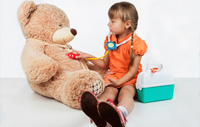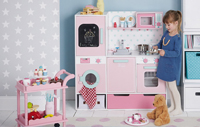Job Search
Tinies has hundreds of childcare jobs across the UK
Our Favourite Toys for Role Play
Learning through play is an important part of a child's development, helping them develop imagination and discover new and exciting adventures
Play is fun. Play is learning
Through play, children learn basic skills such as language, creativity, problem solving and self-control. We understand the importance of role play either in a nursery setting or at home, so we asked the experts at The Great Little Trading Co for their thoughts on role play and some helpful suggestions on toys that can be used to encourage it.
Through role play, children learn how to interact with others, how to express their needs, negotiate and compromise. They figure out complex relationships and learn how to cope with frustration, fear and anger. They explore, test, guess and discover, building foundations for later learning in science and mathematics. Manipulating objects, mark-making, running and jumping in muddy puddles all contribute to the development of fine and gross motor skills. Play is a fundamental part of a child's cognitive, social, emotional and physical development. Through play, children learn how to learn.
Learning from adults
Role-play typically involves the child recalling a familiar situation, such as a shopping trip or visit to the doctor and, acting it out. Children use their memory skills to recreate scenes they have witnessed and practice solving problems that may be part of those scenarios the time mummy forgot her purse at the check-out' or 'when the doctor put the bandage on my leg'.
Role play promotes verbal communication as children copy words they have heard others saying, "that'll be twelve pounds please", "nice cup of tea?", and requires the child to develop listening skills and to respond in an appropriate manner.
Parents are a child's first playmates. Games progress from peek-a-boo and hide-and-seek, to more complex games involving make-believe and role play. These might involve caring for toys or dolls, racing cars along the floor or having a tea party. When parents interact, the play develops, lasts longer and becomes more complex. The adult is teaching the child how to sustain an activity and develop ideas.
As the game progresses, so does the language and complexity of play. The tea party develops into a picnic, a feast, a celebration, or a birthday party for The Queen! The child benefits from the adult's extended vocabulary and creative ideas.
And peers
From the age of two, some children are able to share role-play games with their peers, and by three, many are able to engage in co-operative role play with clearly defined roles; "You'll be the King, I'll be the dragon". Unlike the parent-child relationship where the parent tends to lead the play, play with peers tends to have a more even distribution of power as children have to jointly negotiate the rules of the game 'this chair can be the throne', 'over here is the door'.
Through role play, children learn how to express their desires - "but I wanted to be the dragon"- negotiation tactics - "let's take turns"- and compromise. They learn how to handle conflict and how to settle arguments, how to work in a group and how to behave in social situations - and they learn them in a safe, supportive and risk-free environment, helping other children feel more confident and competent in the world around them.
Children today play around eight hours less per week than children born in the 1980s. Technology has played a part in that decline, but parents' desire for children to grasp the fundamentals of literacy and numeracy by the age of 5 has also meant that some play has been replaced by groundwork for tests or educational 'toys'. Somewhere along the way, we forgot how to play.
Which toys are best for role play?

We believe that the best role-play toys have multiple uses and can be used by a child on their own, or with friends or parents. They should be robust enough to last for years, sturdy to withstand extended bouts of play with friends and siblings, and good looking enough to have on permanent display in your home.
The best role-play toys are accessible so the child can spontaneously decide when and how to play. This means toys need to be left out, in the home, where children can easily reach them.
These are a few of our favourites:
- Dolls' houses and toy garages - scaled-down environments give children the chance to be in charge. Re-enacting real-life scenarios, or letting a dinosaur loose in the dolls' house living room, encourage imaginations to run wild.
- Play kitchens are at the heart of role play. While children are using their imagination to mimic the world around them, they're also learning chopping, stirring, turning, opening, carrying and closing skills, and increasing their vocabulary.
- Play shops with pretend food - tills and money fascinate children and provide multiple role-play opportunities as children pretend to be customers or shop owners. Handling play money can also develop numerical skills.
Play should be enjoyable, never forced, freely chosen by the child and involve a degree of make-believe. But above all, the act of playing, is more important than any end goals.
